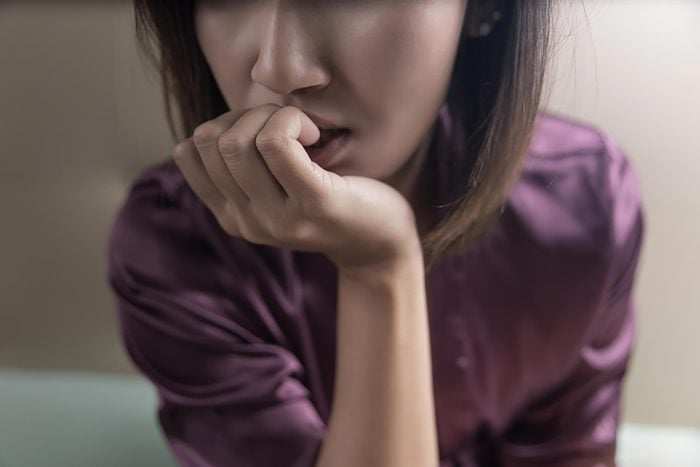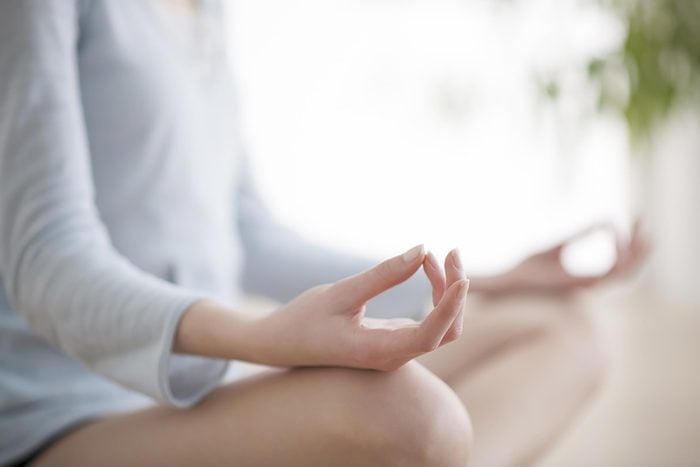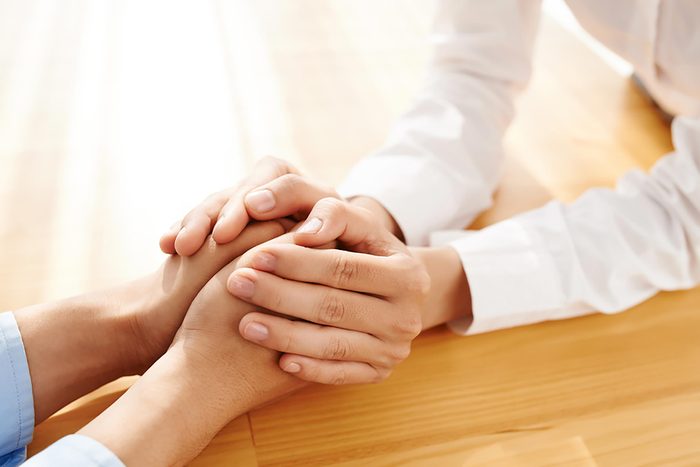What crisis counselors know about anxiety
When it comes to managing stress and anxiety, there are things that you can do that help—but it doesn’t mean it’s easy. It can feel especially challenging to deal with anxiety during times of crisis, like the outbreak of Covid-19. If you’re experiencing anxiety about coronavirus, text HOME to 741741 to connect with a crisis counselor. Read on for the inside scoop from crisis counselors on coping mechanisms for anxiety and how best to deal with stress—no matter the type of crisis. Here’s what they want you to know.

Find a sympathetic ear
Your feelings can be undermined by the belief that you shouldn’t feel anxious, that your feelings aren’t valid—and this can be reinforced by well-meaning family members and friends. Their intentions may be good, but that sentiment is useless during an anxious spell; you can end up feeling guilty on top of anxious. A little acknowledgment goes a long way, says Kate Mallow, manager of the National Alliance on Mental Illness Helpline. Mallow says the phrase she uses is: “It’s okay to feel what you’re feeling.” This validates your experience and justifies what you’re going through.

Look for the active listeners in your life
We’ve all been in the conversation with the person looking over your shoulder, eyes glassed over, looking to interject his or her next opinion. If you’re gripped by anxiety, you need someone who is really listening, and can prove it by asking thoughtful questions or is able to summarize your concerns. Mallow says that crisis counselors sometimes demonstrate active listening simply by repeating back, summarizing, or asking for clarification. (Find out 14 things only people with anxiety understand.)

Know you’re not alone
Depending on your particular experience of anxiety, there’s a chance that feeling isolated and alone may contribute to the problem. Hearing a personal story from someone who has anxiety might act as a good coping mechanism for anxiety as it can sometimes help soothe that disconnect. Kat Katz, a volunteer for NAMI and CrisisLink, has multiple anxiety disorders. The choice to disclose personal information while serving on the hotline is a complex one. Before sharing parts of her story, Katz asks herself if disclosing will help someone feel connected. If she intuitively feels that the answer is yes, she will share a relevant story. She says, “It helps to talk to someone who can get at least a piece of what you’re going through. I disclose that I have anxiety disorders, that it’s a struggle for me, and I am working on it every day. I’ll talk about what works for me.”

Focus on your senses
Physical awareness can help center a person who is feeling anxious. Mallow has a favorite coping mechanism for anxiety called the 5-4-3-2-1 technique. Start by naming five things you can see right now, four things you can touch, three things you hear, two things you smell, and one thing you can taste. This sensory exercise helps ground someone overwhelmed by inner turmoil, allowing them to slow down and be present in the moment. Mallow vividly remembers one caller slowing down to savor the smell of her vanilla scented candles. Meditation can also help ease the stress that leads to anxiety. (Here are some natural remedies for anxiety.)

Remember to breathe
Yes, that’s supposed to be an automatic body function. But when anxiety gets its hooks in you, it can make you hyperventilate or breathe erratically; disordered breathing can actually exacerbate your stress. That’s why crisis counselors often suggest callers search for “breathing gifs” online; these guides are remarkably effective at getting people to breathe evenly, slow their heart rate, and calm nerves. The counselors at crisistext.org often suggest this meditative gif.

Drive yourself to distraction
Mallow often asks callers about the weather to help them reset their focus. Yes, you will have to confront the fears and stressors that trigger your anxiety, but sometimes an off-topic conversation can offer a useful, relaxing break. Eventually, distraction techniques can lead to frustration, especially if you really need to talk directly about your problems. But try a diversionary chat every so often to help you refocus.

Develop a plan
Once you’ve found strategies that work for you, come up with an action plan you can turn to when anxiety begins to build. Katz says coping skills won’t always work, especially in severe cases: “Some people think anxiety is something you can just push through and it’s not.” If coping skills fail, things like therapy or medication could help. Nonetheless, it’s worth developing a step-by-step plan that incorporates the coping mechanisms for anxiety that work best for you, too. You might start with breathing exercises, and then progress to meditation or yoga to relax your muscles. From there, you might try distraction or calling that trusted person who will listen. You can find examples and suggestions on NAMI’s site, or on anxietycanada.com.

Don’t be afraid to reach out
Often anxiety can be internal—and invisible to the people around you. “If you reach out and say ‘hey, I’m struggling,'” says Mallow, “it passes the torch to someone else. Everyone is touched by mental health in some way, shape or form.” You’ll find that people are willing to help you shoulder the burden. “Whether it’s a counselor on a crisis helpline, parents, colleagues, or friends, there is always someone out there that can empathize.” (Find out the signs of high-functioning anxiety.)

Know that it will get better
Getting help can look different for everyone. It might involve medication, therapy, reaching out to helplines, attending support groups—or some combination of these approaches. You might even be able to find help through natural anxiety remedies including maintaining a healthy diet, consistent exercise, and yoga, as well as meditation, too. Prolonged anxiety can be extremely tough but relief is possible thanks to a variety of coping mechanisms for anxiety. Just know that it will take time to heal, says Katz. Mallow adds: “Getting trapped in your own head can be scary. You don’t have to live in a state of anxiety. It can get better.” (Next, don’t miss these tips from therapists on how to deal with anxiety.)

